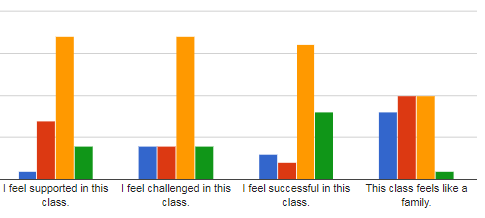I have done this with some subgroup of my students every year since Aaron has offered it. I choose my CSA students this year because it was my second year teaching the course, I had made changes and I still have some changes I want to make, but I was interested in getting student thoughts.
He broke the results down by hour.
Last year a different person did in my classroom and they were like "here are your results" with nothing afterwards. I realized I needed to talk through it with someone. Thankfully Aaron was a captive thought partner.
One of the first things he said was how he felt a big difference between my two sections of CSA. I, too, have struggled with this. One hour used to be 36 kids big (now just 30) and the other one is 20. Aaron even mentioned that the first section seemed almost combative whereas the second one seemed more friendly. I am glad I am not the only one with this perspective. I have said this before, but class size does matter. Having 20 kids allows me to teach and be more responsive in a way I cannot be in my class of 30.
Another perspective Aaron had was that he only pays attention to the perspectives that had more than 50% of agreement. I appreciate that to an extent. BUT if we are to help ALL kids learn, even if 1 kid has an opinion that maybe is an outlier, that can still be considered. I suppose it makes sense to focus on how can I change my instruction to impact the most students.
This year, I had a lot of "I wonder what the heck they mean by XX" moments. Aaron could provide some perspective on that based on his conversations with students. He also recommended I talk to students to get more perspective. I think that is a good idea in a very structured manner.
Here were some of my biggest surprises and thoughts:
- Students in my 5th hour like to work together, but don't like pair programming. That is confusing to me. We actually haven't done pair programming for a while, but we should do it again soon. I think I need to be more clear on what the expectations are for pair programming. A few Twitter peeps have made a rubric for pair programming that I am going to start to use.
- 6th hour mentioned the "examples" as being helpful. When ever my 5th hour struggles a lot, I adjust and do more hand holding with 6th hour. We might do something together or do a "code-along" or something like that. I probably need to do that more with my 5th hour too. I just need to have more extensions for advanced students in my 5th hour.
- Students like test reviews. I think this goes back to a culture, especially around "AP students" that they think doing a review is a "short cut" to learning the material. As long as they are still working in class throughout the entire unit, I am ok with giving a review.
- Grading more things. This came up in both classes. I think this group is reluctant to do things unless they get a grade for it. Aaron suggested to have students reflect on their learning for the things I don't collect, and then put their own self-reflection grade in a no-count grade in the gradebook. I contend that students just get crabby if I don't collect things. They feel like "why did I do this, if I am not going to get graded on it". I need to coach them out of that mindset. For the time being, I think I can do a better job of just collecting more programming tasks.
What's next? Well here are some changes I can make immediately:
- I think I need to have students reflect on pair programming - I can use Dan's rubric and Aarons google form to collect this reflection. In general, I think I need to build in more reflection time in general in the class. One way we can do that is to read this article and use a protocol to have students think through their role in the class.
- I would like to get a bit more meta. I want students to be able to articulate when they are learning. How they know they are learning. I have answers to these questions, but I think student's might see some of the class time as being "wasted" because they are spinning their wheels (or for other students, copying and pasting code). They need to be able to think about their own learning.
- Talk about what "effective" class time looks like. I want students to decide what it means to use our class time effectively. I want to come to an agreement as to what I need to do as the teacher to make effective use of our class time and what they need to do as students to make effective use of the class time. I think it is also important to be transparent that while they have ideas about learning, which may be valid, at times I will need to pull rank as the expert in learning in the room.
Ending note: I was talking/tweeting with The Dan Schneider and was lamenting how I have not done enough writing/reflecting this year. In the spirit of #MTBoS, I decided to #justPostIt and forget about the little details of refining this post. I started writing this 4 days ago, and now as I am planning my next week, it is time to just post it.












